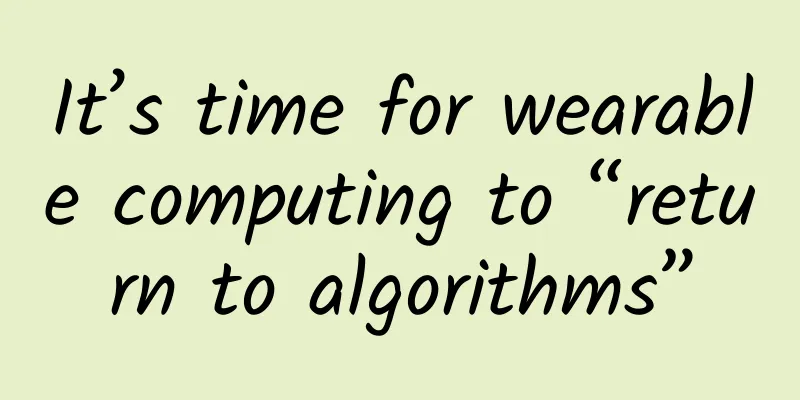It’s time for wearable computing to “return to algorithms”

|
In April 2014, the “big companies” did two things in the market of health monitoring electronic consumer products: Nike cut off the hardware development project of Fuelband bracelet and turned to software development; and Facebook acquired ProtoGeo Oy, a Finnish startup that developed the health mobile tracking application Moves, for an undisclosed price, and stated that ProtoGeo would maintain its independent operation at this stage. From the perspective of the company's future planning, both Facebook and Nike have given their own predictions on the consumer market related to "monitoring human health": the former chose to abandon the two-year project, while the latter actively invested in this market. The reasons and causes for the two companies to make different judgments may be different. But from the results, these are by no means two relatively isolated business cases. At least, they revealed the same thing during this period: when people were optimistic about smart hardware and wearable computing products, the focus of these two companies fell back on mobile phones - using the most widely used smart hardware as the center of data collection and calculation. Behind this is the fact that it is time for wearable computing to return to algorithms. There is an interesting piece of information in the process of Fuelband being cancelled: although the Fuelband project was terminated by Nike, the NikeFuel department that developed the algorithm was retained by the company. On April 11, Nike announced the establishment of the Fuel Lab in San Francisco, opening the NikeFuel platform to third-party developers to seek more innovative applications - this fully proves that Nike has no patience to wait for the realization of the value of Fuelband hardware, which is also an important element in the initiation and termination of the project - simple health data collection. When Apple CEO Tim Cook showed up at the Allen & Company annual conference in 2012 with the first generation of Fuelband bracelets, everyone was imagining that Nike and Apple would have a good relationship and that health bracelets would be a good supplement to Apple's business. Prior to this, Apple's iTunes software platform had accumulated 500 million users - they download songs, apps, and share photos and social information every day - which made Apple seem to have a large amount of user data, but in fact, this data is of very limited significance at present, because the data is not generated by users in real time, or can guarantee continuous detection of users in specific scenarios. Apple only gets fragmented, jigsaw-like scattered information. In the absence of a better solution, Fuelband was considered by Nike as an important product in cooperation with Apple. It is a hardware device with interactive sense, which is not only a small gadget like the sensor in the shoe, but also an interactive device on the iOS Nike+ software platform. At the same time, Nike also painstakingly found more than 10 software teams for Fuelband to develop a mobile phone app specifically for this product, hoping that a large number of users will use this product and generate the expected accurate and real-time data. The final result proves that the value of a device that only collects data is not very imaginative. Among them, Fuelband has limited accuracy in detecting human movements. On Quora, there was a problem that users could not figure out how their step count was calculated. Moreover, it is limited by scenes such as taking a shower, making it difficult for users to carry it with them. At the same time, many health monitoring applications have gradually appeared on mobile phones, and they can replace the simple monitoring function of Fuelband to a certain extent. Moves is one of them. Moves, a mobile health tracking app developed by Finnish startup ProtoGeo Oy, can identify and record the user's daily movement trajectory and walking steps through the accelerometer on the phone, and calculate the calories generated by personal exercise. It has been downloaded more than 40 million times on the iOS platform. Like Moves, the heart rate detection app Instant Heart Rate and sleep recording software Sleep Time developed by Azumio also monitor the user's body through software algorithms. The former uses the flashlight built into the phone as a recorder. Users only need to cover their fingers on the flashlight, and the software can record and calculate the user's heartbeat. The series of apps developed by the company have captured about 40 million users. Internet companies such as Facebook are particularly interested in R&D teams that excel in this type of algorithm, because they do not need to develop or acquire a hardware company to develop hardware that only monitors data. They can mostly implement these functions on mobile phones through software. This is more valuable when "health big data" cannot be truly understood and used by users. Nike has also figured this out. On April 26, Nike CEO Mark Park revealed that the Nike+ software platform and application ecosystem already has 30 million users, and hopes to increase this number to 100 million in the future. Nike will focus on how to increase the number of Nike+ users in the future, rather than spending huge amounts of money on hardware development. The disappearance of the Fuelband project proves that if there is no better product to put users in a closed loop of software and hardware, it would be a better choice to develop a software platform based on mobile phones. As a winner of Toutiao's Qingyun Plan and Baijiahao's Bai+ Plan, the 2019 Baidu Digital Author of the Year, the Baijiahao's Most Popular Author in the Technology Field, the 2019 Sogou Technology and Culture Author, and the 2021 Baijiahao Quarterly Influential Creator, he has won many awards, including the 2013 Sohu Best Industry Media Person, the 2015 China New Media Entrepreneurship Competition Beijing Third Place, the 2015 Guangmang Experience Award, the 2015 China New Media Entrepreneurship Competition Finals Third Place, and the 2018 Baidu Dynamic Annual Powerful Celebrity. |
<<: Smart TV ecosystem has diversified gameplay: LeTV gradually becomes the industry benchmark
>>: Getui officially releases "Smart Push", and push technology enters the 2.0 era
Recommend
Will the rear fingerprint recognition of iPhone 8 ruin Cook's growth expectations?
Apple is currently in a dilemma of declining sales...
After buying the CNGP laser radar at a high price, it was abandoned by the official. 500 old Xiaopeng P5 owners jointly defended their rights
Recently, nearly 500 Xiaopeng P5 owners jointly s...
Guangzhou takeaway platform mini program development, what are the advantages of catering takeaway mini program?
Soon after the beginning of the year, epidemics b...
How to make Baidu snapshot and how much does it cost to promote Baidu snapshot?
Some customers will ask, "How much does Baid...
How to effectively place Internet advertisements?
Nowadays, facing more and more information impact...
Qinzhou Mini Program Production Company, how much does it cost to make a fabric mini program?
WeChat Mini Program is an application that users ...
A Sen's "Buying National Fortunes - Diagnosing the Future Trends of China's Economy" Audio
A Sen's "Buying National Fortunes - Diag...
Eater, do you know what you are eating?
When you open the shopping websites of JD.com and...
In which direction is Wenchang located in 2020?
In 2020, Wenchang is located in the south of Li P...
How I use WeChat to operate a "social product" with more than 20% daily active users
In everyone’s mind, Internet products are general...
Want to stay healthy by drinking soup? Does this method work?
《Cotton Swab Medical Science Popularization》 Beij...
3 counter-common sense points in channel cooperation
Recently, I met with several newly appointed pres...
How should people with suspected or mild COVID-19 infection be cared for at home?
Following Xi'an and Shenzhen, the epidemic in...
Apple and Google Maps break up
In iOS 6 released two years ago, Apple removed the...
![2021 Postgraduate Entrance Examination English Vocabulary Solution [Postgraduate Entrance Examination] PDF electronic version Baidu Cloud Download](/upload/images/67cc227ce2dc9.webp)








